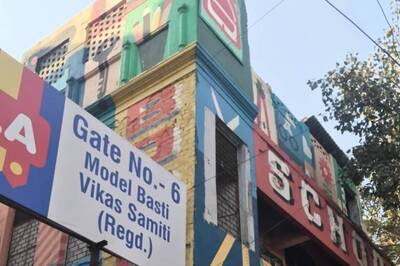
views
window._taboola = window._taboola || [];_taboola.push({mode: 'thumbnails-a', container: 'taboola-below-article-thumbnails', placement: 'Below Article Thumbnails', target_type: 'mix' });Latest News
They say there are two sides to a coin. At a time when every penny mattered to this family, the women of the house caught sight of serendipity flickering in one rupee coins. Chithira made some inspired alterations to the regular ‘parippu vada’ recipe, rolled the batter into tiny globs, flattened and fried them into crisp, coin-sized circles. With her niece Shakthi and aunt Thanamma joining in, the tiny dollops were churned out by the dozens and picked by customers in little heaps. The golden brown vadas, sold for one rupee per piece, have helped the family pull on; bit by bit, penny by penny.
The roadside vending has caught on despite the lack of any facility that might qualify it as a shop. Next to the Attakkulangara Amman temple, sandwiched between petty shops, Chithira and Shakthi would install their makeshift kitchen at two o’clock every afternoon. The batter, prepared in advance, is heaped up on a large round platter and Chithira rolls them up into goblets at express speed. “She can do that quicker than machine,” vouches Shakthi, hoping to make good for her aunt’s absence during the surprise brush with limelight. Chithira had gone to their village in Thenkasi last week and Shakthi was striving to match up to her expertise with help from Thanamma.
“The parippu vadas are the most sought after item and we sell around 700 everyday. We also make uzhunnu vada, vazhakka bajji and mulaku bajji; all coin-sized. Save for mulaku bajji, which is sold at Rs 2 per piece, we charge a flat ` 1 for all items,” says Shakthi, between flattening the globs on her left palm and dropping them into the oil boiling in two iron kadais.
The vadas are bought in tens and twenties by autorickshaw drivers, nearby shop owners, and other regular buyers. There are also the prized customers who would drive down in cars and honk their way to the shop through the busy street, just to pick up a bundle of the teeny-weeny snacks. Shaji, who runs the adjacent stationery shop, says he has been buying them in bulks to take to the mosque after the 11 pm namaz where they are relished with black tea.
The vada recipe at the shop is slightly altered and happily so, but the trade secret is not on offer. As Shaji makes some wild guesses concerning extra ginger and coriander leaves, Shakthi chooses to smile at the vadas in the frying pan. Thanamma listens quietly for a while and then scoffs jokingly, “why don’t you come and make the vadas today?”




















Comments
0 comment